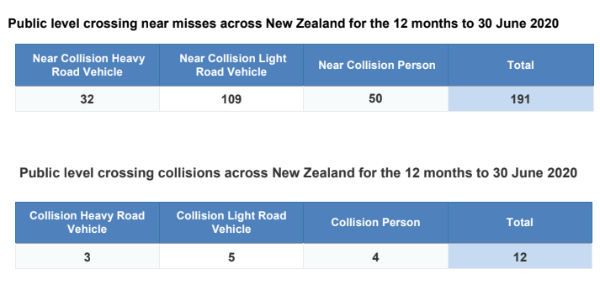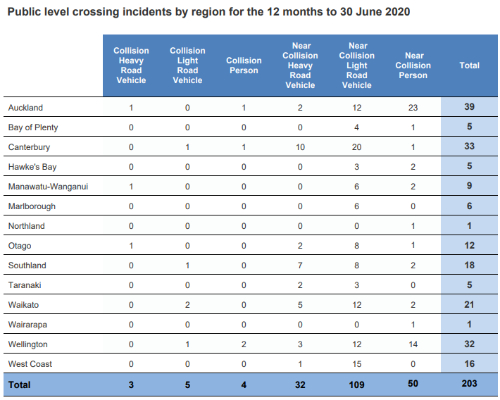Time To End Near-miss Circles Of Trauma
Every day on average, somewhere in New Zealand there is a near-miss on a railway line.
KiwiRail Group Chief Executive Greg Miller says while people might walk or drive away after a near miss, these split-second decisions can cause long-term effects for everyone.
Mr Miller launched Rail Safety Week today at Wellington Railway Station.
"People are risking their lives and just one second of inattention at a railway crossing can create a circle of trauma rippling outwards - impacting friends and families, our drivers and the community.
"A freight train weighing 1,000 tonnes across 30 wagons can take a kilometre to come to a stop once the brakes are applied. It also takes time for the commuter trains in Auckland and Wellington to stop.
"Quite often our locomotive engineers know how it's going to turn out. They sound the horn, hit the emergency brakes and, often, hit the floor and get behind a safety block.
"They are hoping that against all the odds the person or vehicle will get out of the way in time, and that this won't become one of the worst days of their lives."
There has been a drop in recorded near misses on last year, but Mr Miller says that is no reason to relax.

"It's likely the COVID-19 lock-down has played a part in the drop, as between late March and June near misses halved at level crossings compared with the same time last year.
"However, it's not just people and vehicles involved in near misses. Last year there were more than 200 near misses involving livestock in the rail corridor. This is highly distressing for the animals and can be too for the farmers who take care of them."
TrackSAFE NZ Foundation Manager Megan Drayton is also calling on people to take greater care when crossing the railway line.
"In the last twelve months KiwiRail recorded more than 300 near misses across the rail network. Of these, 191 near misses occurred at public level crossings and the majority of those crossings had flashing lights and bells or barrier arms.
"This shows us that even with warning signs and protections in place, some motorists and pedestrians are still either being complacent, or taking unnecessary risks.
"For this year's campaign, we're sharing stories of locomotive engineers who have experienced a near miss that's been caught on camera. It's a chance for people to hear the drivers' stories and to put themselves in their position.
"We've set up a campaign website where people can explore near-miss memorials, which are locations where there's be a recorded near miss, mostly at level crossings.
"These near misses are represented by a thought-provoking half cross 'memorial' to show the severity of what could have happened and that these people narrowly avoided a serious or fatal collision."

The week-long campaign is coordinated by KiwiRail and TrackSAFE NZ in close partnership with Waka Kotahi NZ Transport Agency, NZ Police, Auckland Transport, Transdev Auckland, Greater Wellington Regional Council, Transdev Wellington and many other councils throughout New Zealand.
Rail safety advice:
- Cross with care - trains can arrive at any time from either direction
- If you're driving, obey the warning signs and look carefully in both directions for trains
- Listen, be aware and pay careful attention to your surroundings
- Trains can approach faster than you think, and can be quiet. They are heavy and cannot stop quickly.
- Always ensure there is space on the other side of the crossing for your vehicle before crossing the tracks
- If you're on foot, only cross at a formed level crossing or an overpass or underpass
- Remove your headphones, stop and always look both ways for trains before crossing the tracks
- Only cross if you are sure there are no trains in sight
- Obey the warning signs at the crossing - if lights are flashing or bells are ringing this means a train is approaching
- If a train has passed or is stopped at the station, always check both ways again to make sure another train is not coming. Two tracks may mean there is a second train.


 NZ Customs Service: Customs Agencies Bolster New Zealand-India Engagement To Improve Market Access
NZ Customs Service: Customs Agencies Bolster New Zealand-India Engagement To Improve Market Access  GNS Science: Laser Technology On Subsea Cables Could Provide Earlier Tsunami Warning For The Pacific
GNS Science: Laser Technology On Subsea Cables Could Provide Earlier Tsunami Warning For The Pacific The Reserve Bank of New Zealand: RBNZ Supports Release Of Police’s National Risk Assessment
The Reserve Bank of New Zealand: RBNZ Supports Release Of Police’s National Risk Assessment Bill Bennett: Download Weekly - ComCom Recommends Removing Rural Copper Regulations
Bill Bennett: Download Weekly - ComCom Recommends Removing Rural Copper Regulations Hugh Grant: Why Pay Equity Software Is Essential For A Strong Employee Value Proposition
Hugh Grant: Why Pay Equity Software Is Essential For A Strong Employee Value Proposition Electricity Authority: Electricity Authority Acts Quickly To Strengthen Security Of Electricity Supply Ahead Of Winter
Electricity Authority: Electricity Authority Acts Quickly To Strengthen Security Of Electricity Supply Ahead Of Winter



